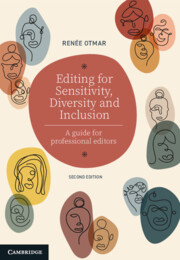Book contents
- Editing for Sensitivity, Diversity and Inclusion
- Acknowledgement of Country
- Editing for Sensitivity, Diversity and Inclusion
- Copyright page
- Dedication
- Contents
- About the author
- Preface
- Acknowledgements
- Part One Foundations
- Part Two Professional practice
- Chapter 5 Identifying the explanatory framework within a text
- Chapter 6 Literary worth versus literary intention
- Chapter 7 Plagiarism
- Chapter 8 Literary appropriation
- Chapter 9 Cultural appropriation
- Chapter 10 Decolonisation
- Chapter 11 Legal reading
- Chapter 12 The main types of critical appraisal
- Chapter 13 Editing for sensitivity, diversity and inclusion
- Chapter 14 Moral and ethical dimensions of editing
- Chapter 15 Developing a workplace policy and style guide
- Chapter 16 Principles for a professional practice
- Chapter 17 Care of the self
- Conclusion
- Part Three Guide
- Index
Chapter 14 - Moral and ethical dimensions of editing
from Part Two - Professional practice
Published online by Cambridge University Press: 24 August 2023
- Editing for Sensitivity, Diversity and Inclusion
- Acknowledgement of Country
- Editing for Sensitivity, Diversity and Inclusion
- Copyright page
- Dedication
- Contents
- About the author
- Preface
- Acknowledgements
- Part One Foundations
- Part Two Professional practice
- Chapter 5 Identifying the explanatory framework within a text
- Chapter 6 Literary worth versus literary intention
- Chapter 7 Plagiarism
- Chapter 8 Literary appropriation
- Chapter 9 Cultural appropriation
- Chapter 10 Decolonisation
- Chapter 11 Legal reading
- Chapter 12 The main types of critical appraisal
- Chapter 13 Editing for sensitivity, diversity and inclusion
- Chapter 14 Moral and ethical dimensions of editing
- Chapter 15 Developing a workplace policy and style guide
- Chapter 16 Principles for a professional practice
- Chapter 17 Care of the self
- Conclusion
- Part Three Guide
- Index
Summary
Throughout this guide, you will find that, in addition to their ideological or theoretical foundations, most of the considerations, discussions and decisions you participate in through the editing process are necessarily framed within a moral or ethical lens. Here, I differentiate between the terms:
moral – personal/individual conceptions of right and wrong, and how we should live – and
ethical – upholding standards for right and wrong/good and bad in a particular setting.
Keywords
- Type
- Chapter
- Information
- Editing for Sensitivity, Diversity and InclusionA Guide for Professional Editors, pp. 135 - 144Publisher: Cambridge University PressPrint publication year: 2023

